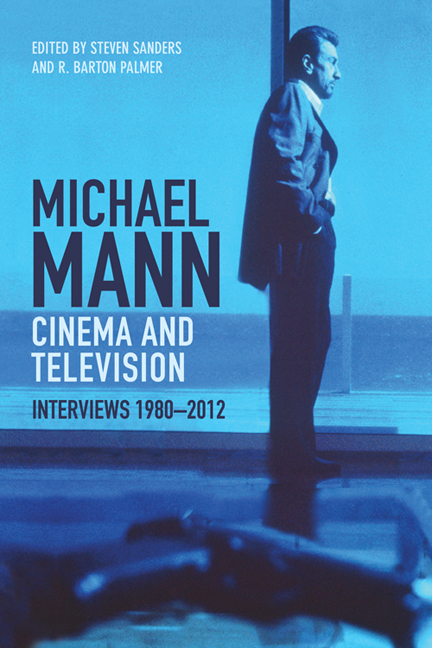Book contents
- Frontmatter
- Contents
- List of Illustrations
- Acknowledgements
- Introduction: Michael Mann in His Interviews
- 1 Four Minute Mile
- 2 Castle Keep
- 3 Of Vice and Mann
- 4 Manhunter: An Interview with Michael Mann
- 5 Michael Mann: Hollywood Writer–Director–Producer
- 6 Mann and His Movies
- 7 All the Corporations’ Men
- 8 Smoking Gun
- 9 “Ali Likes the Film a Lot. He's Seen it Six Times”
- 10 Paint it Black
- 11 Mann Among Men
- 12 L.A. Belongs to the Coyotes
- 13 Michael Mann Interview
- 14 A Mann's Man's World
- 15 Number One with a Bullet
- 16 The Study of Mann
- Chronology
- Filmography
- Publisher's Acknowledgments
- Index
9 - “Ali Likes the Film a Lot. He's Seen it Six Times”
Published online by Cambridge University Press: 05 September 2016
- Frontmatter
- Contents
- List of Illustrations
- Acknowledgements
- Introduction: Michael Mann in His Interviews
- 1 Four Minute Mile
- 2 Castle Keep
- 3 Of Vice and Mann
- 4 Manhunter: An Interview with Michael Mann
- 5 Michael Mann: Hollywood Writer–Director–Producer
- 6 Mann and His Movies
- 7 All the Corporations’ Men
- 8 Smoking Gun
- 9 “Ali Likes the Film a Lot. He's Seen it Six Times”
- 10 Paint it Black
- 11 Mann Among Men
- 12 L.A. Belongs to the Coyotes
- 13 Michael Mann Interview
- 14 A Mann's Man's World
- 15 Number One with a Bullet
- 16 The Study of Mann
- Chronology
- Filmography
- Publisher's Acknowledgments
- Index
Summary
There are few obvious parallels between the boxer and his biographer. In one corner you have a rangy African–American from Kentucky, a champ by the age of 22. In the other there's a stocky Chicago Jew who barely began punching his weight as a film-maker until early middle age. Yet one quality at least links Muhammad Ali and Michael Mann: both men talk a terrifically good fight.
In Mann's film Ali, the hero spends the first 20 minutes or so in a kind of wordless reverie before blowing noisily into the weigh-in for the first Sonny Liston fight, bragging 19 to the dozen. Likewise Mann, who prowls deliberately around his hotel room for a few moments, arranging chairs, ordering coffee, pouring water. Then he takes his seat, and – bam! He talks about the political and racial tensions of mid-1960s America, about how Ali was wired into every cultural conflict going. About how he was studying film in London at the time of the Liston rematch and stayed up until nearly 3 A.M. to watch it on TV; how the first-round knockout was over in an instant. His speech is a flurry of passion and justification, a crash course in his own artistic credentials.
One suspects that this normally wouldn't matter to Mann. This, after all, is the director of films such as Manhunter, Heat and The Insider: he shouldn't need to argue his case with anyone. And yet the Ali film was a prize that had to be earned. Ever since it was first mooted as a possibility a decade ago, the film has been one of Hollywood's more prestigious projects. At one stage it looked as though Barry Sonnenfeld (Get Shorty, Men in Black) would direct the picture, with Will Smith in the title role. Then Sonnenfeld slipped out of the frame, while Smith stayed on board.
For a few fraught months the script was tugged between two film-makers, Michael Mann and Spike Lee. The decision lay with backers Sony. Their budget was set at $100 million and Mann, who had just received an Oscar nomination for his smoking-gun tobacco industry exposé The Insider, was generally regarded as the safer pair of hands. Lee was left smarting, protesting the decision and complaining (via a friend quoted in the New York Post) that “only a black man could do justice to the Cassius Clay story.”
- Type
- Chapter
- Information
- Michael Mann - Cinema and TelevisionInterviews, 1980-2012, pp. 78 - 80Publisher: Edinburgh University PressPrint publication year: 2014



